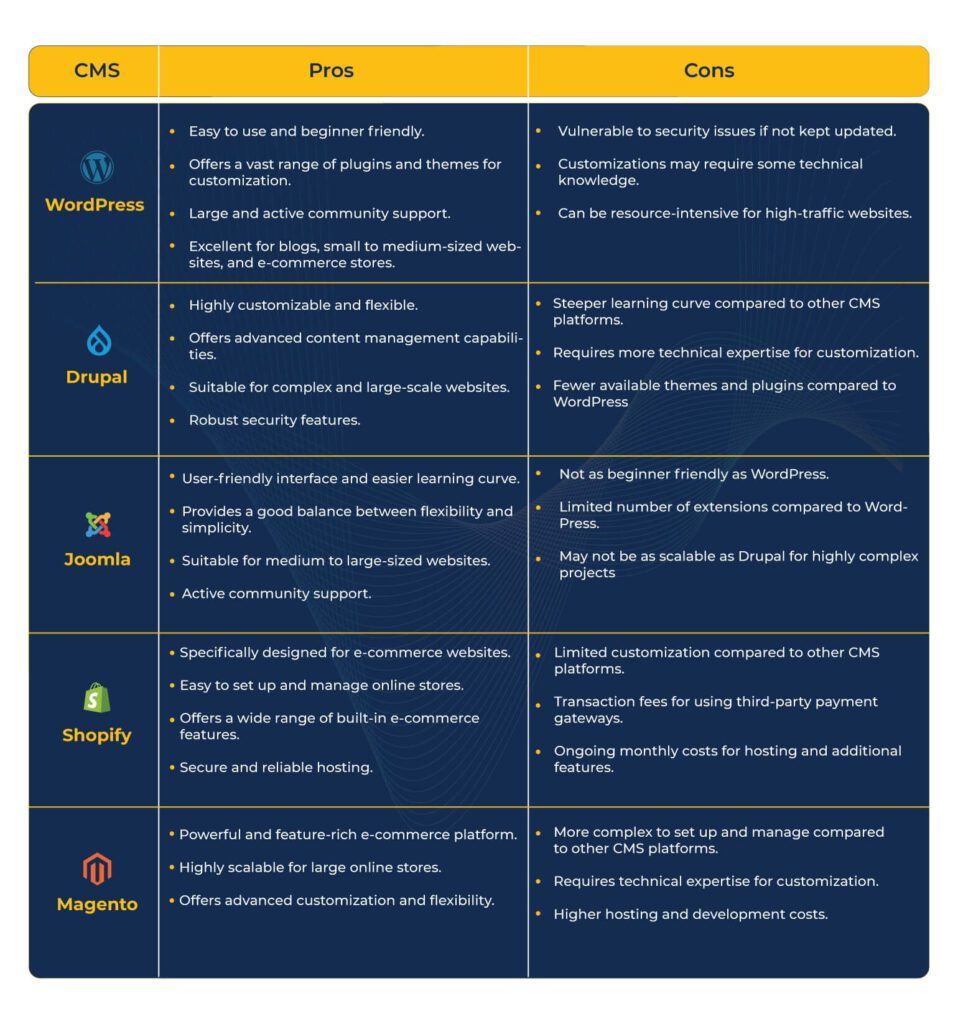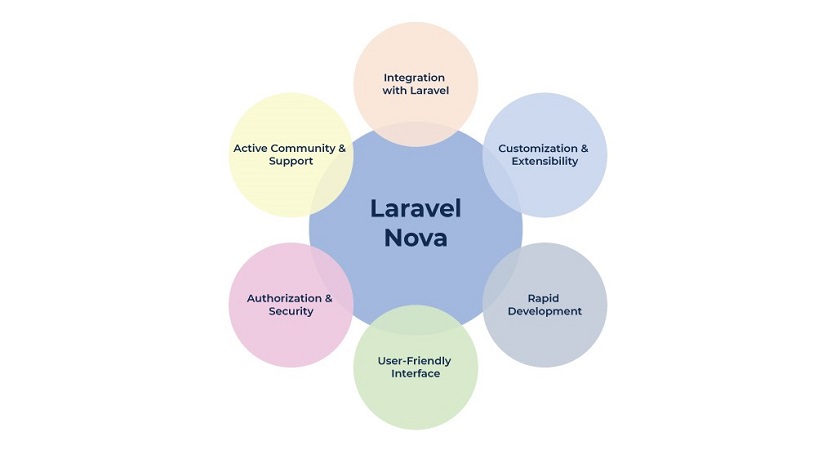Content is king, as they say in the marketing world. But your content is only as good as you manage it, which is what makes content management platforms vital for businesses worldwide. A content management system (CMS) plays a crucial role in empowering content creators and website administrators to manage and publish content efficiently, ultimately enhancing the user experience for website visitors.
The importance of any CMS lies in its ability to simplify the process of content creation, editing, and management, making it easier for individuals and organizations to maintain an online presence and improve engagement with their audience. Laravel Nova is an important asset when it comes to CMS.
This article explains the benefits of utilizing content management systems, and more precisely Laravel Nova. We will discuss the steps you need to take to choose the right CMS platform for your website, and when and why you should opt for Nova as your choice of CMS. We have also outlined the pros and cons of leading content management platforms in Enterprise web presence.
What is Laravel Nova?
By Laravel Nova, we refer to a management interface that is used specifically for Laravel web apps. Laravel Nova CMS is all about an intuitive experience for developers, users, and customers. Nova CMS has relevant tools and interfaces that are perfect for content management and are customizable for developing bespoke admin panels. These panels are customizable as required by the developers or users. While there are other Laravel CMS companies Laravel Nova is the best Laravel CMS.
Content Management System Laravel is extendable as per the project requirements. It uses its features and functionality to offer a smooth and intuitive experience that involves simple and hassle-free interaction with third-party tools. Nova CMS is considered one of the finest and Laravel best CMS because of its third-party tools and services. If you want our Laravel Nova review, it would be that it is capable of exceptional data filtering and searching along with custom metrics and beautiful visualizations.
Benefits of Using Laravel Nova as CMS

Here are some of the key benefits of using a CMS.
- Easy Content Creation: CMS platforms allow users to create content easily using a simple interface that does not require advanced technical skills or knowledge.
- Streamlines Content Management: CMS platforms provide an intuitive dashboard that makes it easy to manage content, including creating, editing, and publishing.
- Efficient Workflow: Content management platforms support collaborative workflows, which enable multiple users to work on the same project at the same time. This reduces the time and effort required to create and publish content.
- Flexible Design: Another benefit of a CMS is that it provides a range of templates and design options that allow users to customize the look and feel of their website or application without the need for extensive coding skills.
- Scalability: You can easily scale your CMS up or down, depending on your needs. The scalability factor makes it easy for businesses to manage growth and accommodate changes in demand. Laravel Nova CMS is known for its scalability or extendibility and that makes it one of the best Laravel CMS.
A Step-by-Step Guide to Choose the Right CMS
It’s essential to evaluate your specific needs and consider factors like technical expertise, scalability, security, and available resources before choosing the right CMS. Admittedly, there are many companies and service providers but this guide will help you find the best Laravel CMS companies.
Here’s a step-by-step guide to help you make an informed decision:
Define Your Website Goals and Requirements
Start by understanding the purpose and goals of your website. Determine the type of content you plan to publish, the level of customization required, and any specific features or functionalities you need.
Assess Your Technical Expertise
Evaluate your technical skills and resources available for managing the CMS. Some platforms require more technical knowledge for customization and maintenance than others. Consider whether you have the in-house expertise or if you’ll need external assistance.
Consider Scalability and Future Growth
Anticipate the future growth of your website. Determine if the CMS can scale as your website expands and can handle increased traffic while supporting additional features or functionalities that you may require down the line.
Evaluate Ease of Use
Consider the user-friendliness of the CMS interface. If you or your team members have limited technical knowledge, opt for a CMS with an intuitive and beginner-friendly interface that simplifies content management tasks. Nova is by far the Laravel headless CMS option for its ease of service and use.
Explore Available Features and Flexibility
Review the features and flexibility offered by each CMS. Look for essential functionalities such as content creation, editing, publishing, media management, user management, SEO capabilities, e-commerce support (if needed), and the ability to extend functionality through plugins or extensions.
Consider Security
Evaluate the security features and reputation of the CMS. Look for platforms that prioritize security, offer regular updates, and have a strong track record of protecting websites from vulnerabilities and attacks.
Review Costs and Budget
Consider the costs associated with the CMS, including licensing fees, hosting, additional themes or plugins, and ongoing maintenance. Assess if the CMS aligns with your budgetary constraints.
Test and Compare
If possible, test the CMS platforms you’re considering by setting up a demo or trial version. This allows you to explore the interface, features, and customization options firsthand, helping you make an informed decision based on your experience.
Pros and Cons of Leading CMS Platforms
Here are the pros & cons of some of the leading content management systems.

A Word on Nova CMS
Nova is a robust and user-friendly content management system (CMS) that empowers individuals and businesses to manage their digital content efficiently. Designed with versatility and ease of use in mind, Nova CMS offers a wide range of features and functionalities that streamline the content creation and publishing process.
Users can utilize the intuitive interface of Laravel Nova to easily create and edit web pages, blogs, articles, and multimedia content without requiring extensive technical knowledge. Nova CMS also provides advanced collaboration tools, allowing multiple users to contribute and collaborate on content creation, review, and approval processes.
Laravel Nova also offers powerful content organization capabilities that enable users to categorize and tag content for easy search and retrieval. Moreover, by utilizing Laravel Nova, you guarantee a seamless user experience with responsive and mobile-friendly designs, ensuring content appears optimal on all devices. It assures consistency and accessibility, enhancing user satisfaction across various platforms.
Nova – Is it the Right CMS For Your Website?
Nova is an excellent choice for your website if you are already using Laravel or planning to use it as the framework for your project. Laravel Nova integrates seamlessly with Laravel applications. Nova CMS leverages Laravel’s features, conventions, and libraries, allowing you to benefit from the Laravel ecosystem while managing your application’s backend.

Laravel Nova is not a CMS itself, but rather an administration panel for building web applications using Laravel. It provides a convenient way to manage the backend of your Laravel application by offering a customizable administration interface.
Nova Best CMS Solutions
There is often a lot of debate on what is Laravel Nova, which is the best Laravel CMS, and which Laravel CMS companies one should look for. Laravel Nova is not a CMS itself, but rather an administration panel for building web applications using Laravel. It provides a convenient way to manage the backend of your Laravel application by offering a customizable administration interface.
Being customizable and extendable, Laravel Nova comes with the support for custom fields and actions which make it a hit amongst the developer community. Laravel Nova is a must-have tool or interface for developers who operate and specialize in this technology.
Reasons to Choose Laravel Nova as CMS
Here are some reasons why you might consider using Laravel Nova for your web application:
- Integration with Laravel: Laravel Nova seamlessly integrates with the Laravel framework, leveraging its robust features and ecosystem. It follows Laravel’s conventions, making it easy to work with and extend existing Laravel applications.
- Customization and Extensibility: Laravel Nova allows you to customize the administration panel to fit your specific needs. You can define the resources to manage your application’s data and easily add or remove fields, actions, and filters. Additionally, Nova supports creating custom tools and cards to further extend its functionality.
- Rapid Development: By utilizing Laravel Nova, you can accelerate the development process of your web application’s administration panel. It provides a set of pre-built and reusable components, allowing you to quickly set up CRUD (Create, Read, Update, Delete) operations for your application’s resources.
- User-Friendly Interface: Laravel Nova offers a clean and intuitive user interface that is easy to navigate and use. It provides a consistent experience for managing your application’s data and entities, reducing the learning curve for your team.
- Authorization and Security: Nova integrates seamlessly with Laravel’s authentication and authorization mechanisms. You can control access to different parts of the administration panel based on user roles and permissions, ensuring secure and controlled management of your application’s data.
- Active Community and Support: Laravel has a vibrant and active community, which also extends to Laravel Nova. You can benefit from community-driven resources, tutorials, packages, and support when working with Nova.
When Should You Choose Laravel Nova as CMS?
Here are some situations where Laravel Nova CMS can be the right choice for you:
- Custom Web Applications: If you are building a custom web application using Laravel Nova CMS and need an administration panel to manage backend data and resources, Laravel Nova can be a good fit. Laravel Nova CMS simplifies CRUD operations, data relationship management, and customization of the administration interface to align with your application’s requirements. It offers a convenient solution for efficiently managing these aspects within your Laravel application.
- Data Management and CRUD Operations: When your primary focus is on managing data entities, such as creating, reading, updating, and deleting records, Laravel Nova can streamline these operations. It provides pre-built components and an intuitive interface for managing and organizing data efficiently.
- Backend Administration for APIs: If you are developing an API-centric application and require an administrative interface to manage the API resources, Laravel Nova can be a useful tool. It allows you to create resource controllers, define relationships, and control access to API endpoints through its authorization features.
- Customization and Extensibility: Laravel Nova offers customization and extensibility options to tailor the administration panel to your specific needs. In Laravel Nova, you have the flexibility to adjust fields, actions, and filters to suit your data model’s needs. You can also develop custom tools or cards to enhance functionality and customize the UI to reflect your brand or project specifications.
Conclusion
It is worth noting that Laravel Nova is primarily focused on backend administration and may not provide all the features of a full-fledged CMS like WordPress, Shopify, etc. If your project requires more extensive content management capabilities, such as frontend content editing, page building, or user-generated content, you may need to combine Laravel Nova CMS with other best AI tools or consider a dedicated CMS solution.
Eventually, the decision to use Laravel Nova depends on your specific project requirements, technical expertise, and the need for customization and extensibility provided by Laravel’s ecosystem.
If you need further assistance, feel free to drop us a line at [email protected] to book a free consultation session with our team.
FAQs
Laravel Nova provides seamless integration with Laravel, allowing for easy customization and extensibility of the administration panel. It facilitates rapid development with pre-built components and features a user-friendly interface. Additionally, it boasts strong integration with Laravel’s authentication and security mechanisms.
To begin using Laravel Nova, install it through Composer and register the Nova service provider. Next, publish the Nova assets, configure the dashboard, and proceed to define your resources for backend administration.
Laravel Nova is a commercial product, and its licensing details can be found on the official Laravel Nova website. It usually operates on a licensing model where usage necessitates a purchase, and pricing is determined by factors such as the number of developers and projects involved.
A CMS simplifies content creation, streamlines management, and supports efficient workflows while offering flexible design options. Additionally, it allows for scalability to meet varying needs as your project grows.
To select the right CMS platform, first define your website goals and assess technical expertise. Consider factors such as scalability, ease of use, features, flexibility, security, and costs. Conduct thorough testing and comparison of different CMS options to make an informed decision.
Nova is a user-friendly CMS that integrates seamlessly with Laravel. It offers customization, extensibility, rapid development, a user-friendly interface, and integrates with Laravel’s authentication and security features.












